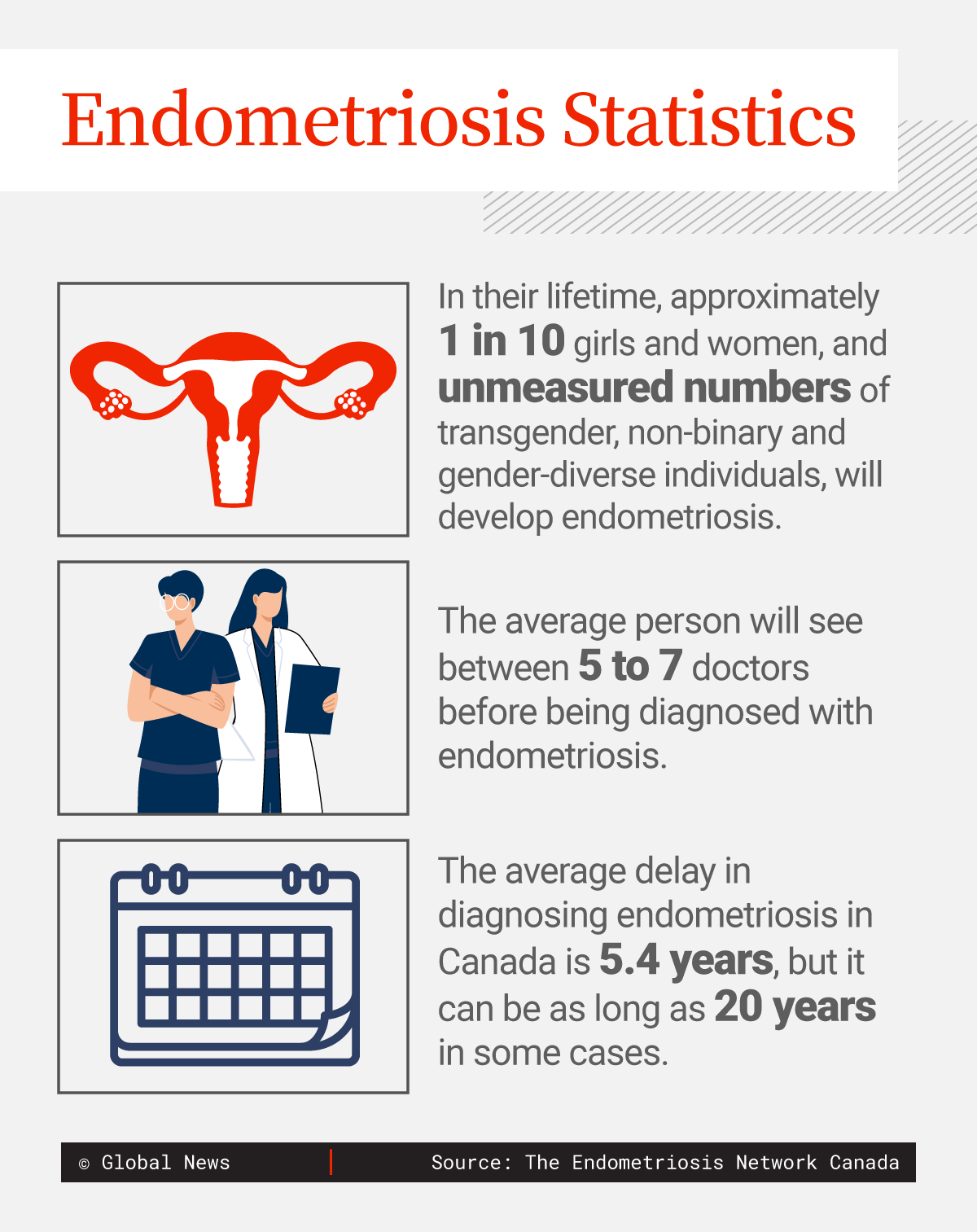After struggling with debilitating pain her whole life, Tara DeMerchant is grateful to finally have answers, but angry it took almost 30 years to get help.
The 44-year-old from Bala, Ont., which is an hour north of Barrie, was recently diagnosed with endometriosis.
DeMerchant says she struggled with pain since she was 14, self-medicating with cannabis to cope with pain that only got worse as time went on.
“It’s debilitating. I have days where I can’t get out of bed. I puked for weeks at a time, and I wouldn’t wish this on anybody,” she recounts.
For years, she says doctors brushed off her pain as just being her period, despite it last lasting the whole month in some cases.
“The pain about nine years ago became daily. I couldn’t get any help. I was refused treatment at least twice. I had a doctor put his finger in my face and tell me that I was doing this to myself and that no doctor was going to help me, and that was the only thing he was right about because no doctor did help me after that,” DeMerchant remembers.
She says that, in some cases, doctors tried to blame cannabis use for her symptoms.
“At least four doctors told me that since the legalization of marijuana, they’ve seen an up spike with this kind of illness, and I tried to tell them it doesn’t have anything to do with me.”
The Endometriosis Network Canada reports that the average delay in diagnosing endometriosis in Canada is five and a half years, but it can be as long as 20 years in some cases. In the case of DeMerchant, she says it took almost 30 years.
Endometriosis is a debilitating chronic condition that occurs when tissue similar to the lining of the uterus implants abnormally outside of the uterus to form lesions, cysts, nodules and other growths.
The condition can lead to those with it experiencing chronic pain and internal scaring, as well as infertility and other medical complications.
DeMerchant says she started pushing for answers and saw multiple doctors before one in Bracebridge finally took her concerns more seriously about a year back.
She says that the doctor wrote a letter saying endometriosis needed to be investigated as a possible reason for her pain by a specialist.
She then went to the Royal Victoria Regional Health Centre in Barrie, where she says she was able to see a gynecologist in late 2023 and then an endometriosis specialist.
DeMerchant recently received the official diagnosis but says it’s considered at an advanced stage due to the long wait.
“I’m finding out in at least the third or fourth stage because that’s when endometriosis grows. So it’s either end stages of that or beginning stages of deep infiltrating endometriosis,” she says.
“It definitely would not be at this stage if I was taken seriously in the beginning.”
While DeMerchant is still waiting for a treatment plan, she says due to the long wait she faces a possible hysterectomy and invasive procedures and biopsies to treat the condition.
Endometriosis Statistics.
Infographic by Fasai Sivieng
The Endometriosis Network estimates that in their lifetime, approximately one in 10 girls and women, and unmeasured numbers of transgender, non-binary and gender-diverse individuals, will develop endometriosis.
The average person will see between five and seven doctors before being diagnosed with endometriosis.
“We hear all the time within the community that folks go to their general practitioner, and then they end up leaving feeling even more isolated, invalidated, being told that it’s totally normal what they’re experiencing just to take a little bit of Advil, and it’s in their head,” says Katie Luciani, executive director of the Endometriosis Network Canada. “These are narratives that are so common within the community.”
Luciani says, in general, menstrual health and periods are seen as a taboo topic, and more needs to be done to educate people to fight the stigma associated with them.
DeMerchant hopes that speaking out will create more awareness.
“I think it’s disgusting. There’s no reason why somebody should have to suffer like this. If they have severe cramping and heavy bleeding and they’re vomiting, there’s something wrong. That’s not a normal period. This has to be taken seriously.”

